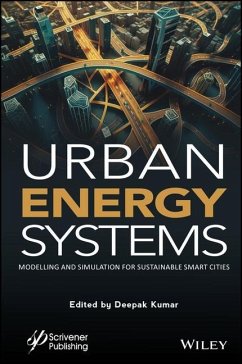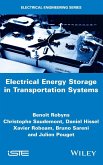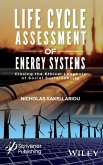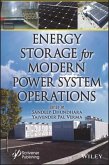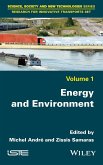Urban Energy Systems
Modeling and Simulation for Smart Cities
Herausgeber: Kumar, Deepak
Urban Energy Systems
Modeling and Simulation for Smart Cities
Herausgeber: Kumar, Deepak
- Gebundenes Buch
Andere Kunden interessierten sich auch für
![Electrical Energy Storage in Transportation Systems Electrical Energy Storage in Transportation Systems]() Benoît RobynsElectrical Energy Storage in Transportation Systems169,99 €
Benoît RobynsElectrical Energy Storage in Transportation Systems169,99 €![Life Cycle Assessment of Energy Systems Life Cycle Assessment of Energy Systems]() Nicholas SakellariouLife Cycle Assessment of Energy Systems234,99 €
Nicholas SakellariouLife Cycle Assessment of Energy Systems234,99 €![Electrochemical Energy Storage Electrochemical Energy Storage]() Jean-Marie TarasconElectrochemical Energy Storage170,99 €
Jean-Marie TarasconElectrochemical Energy Storage170,99 €![Energy Storage for Modern Power System Operations Energy Storage for Modern Power System Operations]() Energy Storage for Modern Power System Operations233,99 €
Energy Storage for Modern Power System Operations233,99 €![Building Professionals Facing the Energy Efficiency Challenge Building Professionals Facing the Energy Efficiency Challenge]() Géraldine MolinaBuilding Professionals Facing the Energy Efficiency Challenge170,99 €
Géraldine MolinaBuilding Professionals Facing the Energy Efficiency Challenge170,99 €![Nanomaterials for Electrochemical Energy Storage Devices Nanomaterials for Electrochemical Energy Storage Devices]() Nanomaterials for Electrochemical Energy Storage Devices245,99 €
Nanomaterials for Electrochemical Energy Storage Devices245,99 €![Energy and Environment Energy and Environment]() Energy and Environment188,99 €
Energy and Environment188,99 €-
-
-
Produktdetails
- Verlag: Wiley
- Seitenzahl: 240
- Erscheinungstermin: 29. August 2023
- Englisch
- Abmessung: 231mm x 152mm x 18mm
- Gewicht: 454g
- ISBN-13: 9781119847441
- ISBN-10: 1119847443
- Artikelnr.: 68505376
Hinweis: Dieser Artikel kann nur an eine deutsche Lieferadresse ausgeliefert werden.
- Herstellerkennzeichnung
- Libri GmbH
- Europaallee 1
- 36244 Bad Hersfeld
- gpsr@libri.de
Deepak Kumar, PhD, is a research scientist at the Center of Excellence in Weather and Climate Analytics, Atmospheric Science Research Center, State University of New York, University at Albany, New York, USA, with over ten years of experience. He has published 3 books. He has also published over 45 and reviewed over 190 research articles in various scientific and scholarly journals, and he has completed two research projects sponsored by the Science and Engineering Research Board, Department of Science and Technology, Government of India.
Preface xi
Acknowledgements xix
List of Chapters and Affiliations xxiii
1 Emerging Trends of Urban Energy Systems and Management 1
Deepak Kumar
1.1 Introduction 2
1.2 Research Motivation 4
1.3 Stand-Alone and Minigrid-Connected Solar Energy Systems 6
1.4 Conclusion 12
References 13
2 Transitions in the Urban Energy Scenario and Approaches 19
Deepak Kumar
2.1 Introduction 20
2.2 Recent Transformation in Energy Sectors 22
2.3 Research Progressions 24
2.4 Breaking the Cycle 25
2.5 Conclusion 27
2.6 Future Implications 27
References 28
3 Urban Renewable Energy Resource Optimization Systems 31
Kalpit Jain and Devendra Kumar Somwanshi
3.1 Introduction 32
3.2 Literature Review 33
3.2.1 Long-Term Sustainable Solar Power Generation 33
3.2.1.1 Common Issues of Long-Term Sustainable Solar Power Generation 39
3.2.1.2 Strengths and Weakness Strength 40
3.3 Conclusion 43
References 44
4 Approaches for District-Scale Urban Energy Quantification and Rooftop
Solar Photovoltaic Energy Potential Assessment 47
Faiz Ahmed Chundeli and Adinarayanane Ramamurthy
4.1 Introduction 48
4.2 District-Scale Urban Energy Modelling 49
4.2.1 "Bottom-Up" Modelling Approach - Archetype 49
4.2.2 The Renewable Energy Modelling Approach 50
4.2.3 Urban Microclimate 50
4.3 Evaluation of Energy Performance - The Case in Chennai 52
4.3.1 Profile of the Case Area 52
4.3.2 Data Model and Construction Techniques 53
4.3.3 Archetype Classification 53
4.3.4 Energy Quantification 55
4.3.5 Analysis of the Archetype Energy Quantification 57
4.3.6 Solar PV Potential Calculation 57
4.3.7 Analysis of Solar PV Potential 58
4.3.8 Scaling of Archetype Building Energy to District-Scale Urban Energy
58
4.3.9 Scaling of Archetype PV Potential to District-Scale PV Potential 59
4.4 Discussions and Conclusions 60
4.4.1 Discussion 60
4.5 Conclusions 61
References 62
5 Energy Consumption in Urban India: Usage and Ignorance 65
Rajnish Ratna and Vikas Chaudhary
5.1 Background 66
5.2 Introduction 67
5.3 Energy Outlook for India 68
5.4 Power Demand and Resources in India 71
5.5 Energy and Environment 73
5.6 Sustainable Development Goals (SDGs) for Indian Electricity Sector 75
5.7 Results 78
5.8 Conclusions 78
References 79
6 Solar Energy from the Urban Areas: A New Direction Towards Indian Power
Sector 81
Sonal Jain
6.1 Introduction 81
6.2 Renewable Energy Chain in India 83
6.3 Development of Solar Photovoltaic and Solar Thermal Plants 84
6.4 Solar Photovoltaic Market in India 85
6.5 Need for Solar Energy 86
6.6 Government Initiatives 86
6.7 Challenges for Solar Thermal Systems 87
6.8 Benefits of Solar PV 88
6.9 Causes of Delay in Solar PV Implementation and Ways to Quicken the Rate
of Installation 89
6.10 Future Trends of Solar PV 90
6.11 Conclusion 90
References 91
Other Works Consulted 92
7 Energy Management Strategies of a Microgrid: Review, Challenges,
Opportunities, Future Scope 93
Chiranjit Biswas, Somudeep Bhattacharjee, Uttara Das and Champa Nandi
7.1 Introduction 93
7.2 Methodology 95
7.2.1 Research Studies Selection Criteria 95
7.2.2 Section of Literature 95
7.2.3 Testing Criteria 95
7.2.4 Extraction of Data 96
7.2.5 Findings 96
7.3 Preliminary 97
7.3.1 Fuzzy Logic-Based Management Strategies 97
7.3.2 AI-Based Management Strategies 103
7.3.3 Other Management Strategies 106
7.4 Challenges of Energy Management in Microgrids 111
7.5 Opportunities 112
7.6 Future Research Direction 113
7.7 Conclusion 113
References 114
8 Urban Solid Waste Management for Energy Generation 119
Shikha Patel and Reshmi Manikoth Kollarath
8.1 Introduction 119
8.1.1 Background 119
8.1.2 Study Focus 121
8.2 Literature Review 122
8.3 Methodology 125
8.3.1 Formulating Research Background 125
8.3.2 Literature Review 126
8.3.3 Analysis 127
8.4 Case Study 127
8.4.1 Precedent Success 127
8.4.2 Precedent Failure 128
8.4.3 The Takeaway from Case Studies 130
8.5 Research Findings: Challenges of Waste-to-Energy Conversion 130
8.5.1 Environmental Challenges 131
8.5.2 Technological Challenges 132
8.5.3 Social Challenges 132
8.5.4 Economic Challenges 133
8.6 Recommendations 134
8.7 Conclusions and Discussion 135
Acknowledgements 136
References 136
9 Energy from Urban Waste: A Mysterious Opportunity for Energy Generation
Potential 141
Shivangini Sharma and Ashutosh Tripathi
9.1 Introduction 142
9.2 Scenario of Solid Waste Management of Various Countries Around the
World 143
9.3 Waste-to-Energy Processes 147
9.4 Challenges to Waste-to-Energy Generation 153
9.5 Conclusion 154
References 155
10 Sustainable Urban Planning and Sprawl Assessment Using Shannon's Entropy
Model for Energy Management 157
Pranaya Diwate, Priyanka Patil, Pranali Kathe and Varun Narayan Mishra
10.1 Introduction 158
10.2 Study Area 159
10.3 Materials and Methodology 160
10.3.1 Satellite Data Used 160
10.3.2 Pre-Processing of Satellite Data 160
10.3.3 Accuracy Assessment 162
10.3.4 LULC Change Detection 162
10.3.5 Shannon Entropy Model 162
10.4 Results and Discussion 163
10.4.1 LULC Maps 163
10.4.2 Accuracy Assessment 163
10.4.3 LULC Change Detection 165
10.5 Conclusion 168
Acknowledgements 169
References 169
11 Sustainable Natural Spaces for Microclimate Mitigation to Meet Future
Urban Energy Challenges 171
Richa Manocha and Deepak Kumar
11.1 Introduction 172
11.2 Nature and Human Connection 174
11.3 Urban Gardening 176
11.4 Urban Greening and Energy Benefits 177
11.5 Nurturing a Connection to Nature in Early Years 177
11.6 Conclusion 180
11.7 Future Implication 181
References 181
12 Synthesis and Future Perspective 193
Deepak Kumar
12.1 Introduction 193
12.2 Synthesis of the Research 195
12.3 Future Urban Energy Policies, and Initiatives 199
12.4 The Challenge Ahead 201
12.5 Strategies for Improvement 201
References 203
About the Editor 205
Index 207
Acknowledgements xix
List of Chapters and Affiliations xxiii
1 Emerging Trends of Urban Energy Systems and Management 1
Deepak Kumar
1.1 Introduction 2
1.2 Research Motivation 4
1.3 Stand-Alone and Minigrid-Connected Solar Energy Systems 6
1.4 Conclusion 12
References 13
2 Transitions in the Urban Energy Scenario and Approaches 19
Deepak Kumar
2.1 Introduction 20
2.2 Recent Transformation in Energy Sectors 22
2.3 Research Progressions 24
2.4 Breaking the Cycle 25
2.5 Conclusion 27
2.6 Future Implications 27
References 28
3 Urban Renewable Energy Resource Optimization Systems 31
Kalpit Jain and Devendra Kumar Somwanshi
3.1 Introduction 32
3.2 Literature Review 33
3.2.1 Long-Term Sustainable Solar Power Generation 33
3.2.1.1 Common Issues of Long-Term Sustainable Solar Power Generation 39
3.2.1.2 Strengths and Weakness Strength 40
3.3 Conclusion 43
References 44
4 Approaches for District-Scale Urban Energy Quantification and Rooftop
Solar Photovoltaic Energy Potential Assessment 47
Faiz Ahmed Chundeli and Adinarayanane Ramamurthy
4.1 Introduction 48
4.2 District-Scale Urban Energy Modelling 49
4.2.1 "Bottom-Up" Modelling Approach - Archetype 49
4.2.2 The Renewable Energy Modelling Approach 50
4.2.3 Urban Microclimate 50
4.3 Evaluation of Energy Performance - The Case in Chennai 52
4.3.1 Profile of the Case Area 52
4.3.2 Data Model and Construction Techniques 53
4.3.3 Archetype Classification 53
4.3.4 Energy Quantification 55
4.3.5 Analysis of the Archetype Energy Quantification 57
4.3.6 Solar PV Potential Calculation 57
4.3.7 Analysis of Solar PV Potential 58
4.3.8 Scaling of Archetype Building Energy to District-Scale Urban Energy
58
4.3.9 Scaling of Archetype PV Potential to District-Scale PV Potential 59
4.4 Discussions and Conclusions 60
4.4.1 Discussion 60
4.5 Conclusions 61
References 62
5 Energy Consumption in Urban India: Usage and Ignorance 65
Rajnish Ratna and Vikas Chaudhary
5.1 Background 66
5.2 Introduction 67
5.3 Energy Outlook for India 68
5.4 Power Demand and Resources in India 71
5.5 Energy and Environment 73
5.6 Sustainable Development Goals (SDGs) for Indian Electricity Sector 75
5.7 Results 78
5.8 Conclusions 78
References 79
6 Solar Energy from the Urban Areas: A New Direction Towards Indian Power
Sector 81
Sonal Jain
6.1 Introduction 81
6.2 Renewable Energy Chain in India 83
6.3 Development of Solar Photovoltaic and Solar Thermal Plants 84
6.4 Solar Photovoltaic Market in India 85
6.5 Need for Solar Energy 86
6.6 Government Initiatives 86
6.7 Challenges for Solar Thermal Systems 87
6.8 Benefits of Solar PV 88
6.9 Causes of Delay in Solar PV Implementation and Ways to Quicken the Rate
of Installation 89
6.10 Future Trends of Solar PV 90
6.11 Conclusion 90
References 91
Other Works Consulted 92
7 Energy Management Strategies of a Microgrid: Review, Challenges,
Opportunities, Future Scope 93
Chiranjit Biswas, Somudeep Bhattacharjee, Uttara Das and Champa Nandi
7.1 Introduction 93
7.2 Methodology 95
7.2.1 Research Studies Selection Criteria 95
7.2.2 Section of Literature 95
7.2.3 Testing Criteria 95
7.2.4 Extraction of Data 96
7.2.5 Findings 96
7.3 Preliminary 97
7.3.1 Fuzzy Logic-Based Management Strategies 97
7.3.2 AI-Based Management Strategies 103
7.3.3 Other Management Strategies 106
7.4 Challenges of Energy Management in Microgrids 111
7.5 Opportunities 112
7.6 Future Research Direction 113
7.7 Conclusion 113
References 114
8 Urban Solid Waste Management for Energy Generation 119
Shikha Patel and Reshmi Manikoth Kollarath
8.1 Introduction 119
8.1.1 Background 119
8.1.2 Study Focus 121
8.2 Literature Review 122
8.3 Methodology 125
8.3.1 Formulating Research Background 125
8.3.2 Literature Review 126
8.3.3 Analysis 127
8.4 Case Study 127
8.4.1 Precedent Success 127
8.4.2 Precedent Failure 128
8.4.3 The Takeaway from Case Studies 130
8.5 Research Findings: Challenges of Waste-to-Energy Conversion 130
8.5.1 Environmental Challenges 131
8.5.2 Technological Challenges 132
8.5.3 Social Challenges 132
8.5.4 Economic Challenges 133
8.6 Recommendations 134
8.7 Conclusions and Discussion 135
Acknowledgements 136
References 136
9 Energy from Urban Waste: A Mysterious Opportunity for Energy Generation
Potential 141
Shivangini Sharma and Ashutosh Tripathi
9.1 Introduction 142
9.2 Scenario of Solid Waste Management of Various Countries Around the
World 143
9.3 Waste-to-Energy Processes 147
9.4 Challenges to Waste-to-Energy Generation 153
9.5 Conclusion 154
References 155
10 Sustainable Urban Planning and Sprawl Assessment Using Shannon's Entropy
Model for Energy Management 157
Pranaya Diwate, Priyanka Patil, Pranali Kathe and Varun Narayan Mishra
10.1 Introduction 158
10.2 Study Area 159
10.3 Materials and Methodology 160
10.3.1 Satellite Data Used 160
10.3.2 Pre-Processing of Satellite Data 160
10.3.3 Accuracy Assessment 162
10.3.4 LULC Change Detection 162
10.3.5 Shannon Entropy Model 162
10.4 Results and Discussion 163
10.4.1 LULC Maps 163
10.4.2 Accuracy Assessment 163
10.4.3 LULC Change Detection 165
10.5 Conclusion 168
Acknowledgements 169
References 169
11 Sustainable Natural Spaces for Microclimate Mitigation to Meet Future
Urban Energy Challenges 171
Richa Manocha and Deepak Kumar
11.1 Introduction 172
11.2 Nature and Human Connection 174
11.3 Urban Gardening 176
11.4 Urban Greening and Energy Benefits 177
11.5 Nurturing a Connection to Nature in Early Years 177
11.6 Conclusion 180
11.7 Future Implication 181
References 181
12 Synthesis and Future Perspective 193
Deepak Kumar
12.1 Introduction 193
12.2 Synthesis of the Research 195
12.3 Future Urban Energy Policies, and Initiatives 199
12.4 The Challenge Ahead 201
12.5 Strategies for Improvement 201
References 203
About the Editor 205
Index 207
Preface xi
Acknowledgements xix
List of Chapters and Affiliations xxiii
1 Emerging Trends of Urban Energy Systems and Management 1
Deepak Kumar
1.1 Introduction 2
1.2 Research Motivation 4
1.3 Stand-Alone and Minigrid-Connected Solar Energy Systems 6
1.4 Conclusion 12
References 13
2 Transitions in the Urban Energy Scenario and Approaches 19
Deepak Kumar
2.1 Introduction 20
2.2 Recent Transformation in Energy Sectors 22
2.3 Research Progressions 24
2.4 Breaking the Cycle 25
2.5 Conclusion 27
2.6 Future Implications 27
References 28
3 Urban Renewable Energy Resource Optimization Systems 31
Kalpit Jain and Devendra Kumar Somwanshi
3.1 Introduction 32
3.2 Literature Review 33
3.2.1 Long-Term Sustainable Solar Power Generation 33
3.2.1.1 Common Issues of Long-Term Sustainable Solar Power Generation 39
3.2.1.2 Strengths and Weakness Strength 40
3.3 Conclusion 43
References 44
4 Approaches for District-Scale Urban Energy Quantification and Rooftop
Solar Photovoltaic Energy Potential Assessment 47
Faiz Ahmed Chundeli and Adinarayanane Ramamurthy
4.1 Introduction 48
4.2 District-Scale Urban Energy Modelling 49
4.2.1 "Bottom-Up" Modelling Approach - Archetype 49
4.2.2 The Renewable Energy Modelling Approach 50
4.2.3 Urban Microclimate 50
4.3 Evaluation of Energy Performance - The Case in Chennai 52
4.3.1 Profile of the Case Area 52
4.3.2 Data Model and Construction Techniques 53
4.3.3 Archetype Classification 53
4.3.4 Energy Quantification 55
4.3.5 Analysis of the Archetype Energy Quantification 57
4.3.6 Solar PV Potential Calculation 57
4.3.7 Analysis of Solar PV Potential 58
4.3.8 Scaling of Archetype Building Energy to District-Scale Urban Energy
58
4.3.9 Scaling of Archetype PV Potential to District-Scale PV Potential 59
4.4 Discussions and Conclusions 60
4.4.1 Discussion 60
4.5 Conclusions 61
References 62
5 Energy Consumption in Urban India: Usage and Ignorance 65
Rajnish Ratna and Vikas Chaudhary
5.1 Background 66
5.2 Introduction 67
5.3 Energy Outlook for India 68
5.4 Power Demand and Resources in India 71
5.5 Energy and Environment 73
5.6 Sustainable Development Goals (SDGs) for Indian Electricity Sector 75
5.7 Results 78
5.8 Conclusions 78
References 79
6 Solar Energy from the Urban Areas: A New Direction Towards Indian Power
Sector 81
Sonal Jain
6.1 Introduction 81
6.2 Renewable Energy Chain in India 83
6.3 Development of Solar Photovoltaic and Solar Thermal Plants 84
6.4 Solar Photovoltaic Market in India 85
6.5 Need for Solar Energy 86
6.6 Government Initiatives 86
6.7 Challenges for Solar Thermal Systems 87
6.8 Benefits of Solar PV 88
6.9 Causes of Delay in Solar PV Implementation and Ways to Quicken the Rate
of Installation 89
6.10 Future Trends of Solar PV 90
6.11 Conclusion 90
References 91
Other Works Consulted 92
7 Energy Management Strategies of a Microgrid: Review, Challenges,
Opportunities, Future Scope 93
Chiranjit Biswas, Somudeep Bhattacharjee, Uttara Das and Champa Nandi
7.1 Introduction 93
7.2 Methodology 95
7.2.1 Research Studies Selection Criteria 95
7.2.2 Section of Literature 95
7.2.3 Testing Criteria 95
7.2.4 Extraction of Data 96
7.2.5 Findings 96
7.3 Preliminary 97
7.3.1 Fuzzy Logic-Based Management Strategies 97
7.3.2 AI-Based Management Strategies 103
7.3.3 Other Management Strategies 106
7.4 Challenges of Energy Management in Microgrids 111
7.5 Opportunities 112
7.6 Future Research Direction 113
7.7 Conclusion 113
References 114
8 Urban Solid Waste Management for Energy Generation 119
Shikha Patel and Reshmi Manikoth Kollarath
8.1 Introduction 119
8.1.1 Background 119
8.1.2 Study Focus 121
8.2 Literature Review 122
8.3 Methodology 125
8.3.1 Formulating Research Background 125
8.3.2 Literature Review 126
8.3.3 Analysis 127
8.4 Case Study 127
8.4.1 Precedent Success 127
8.4.2 Precedent Failure 128
8.4.3 The Takeaway from Case Studies 130
8.5 Research Findings: Challenges of Waste-to-Energy Conversion 130
8.5.1 Environmental Challenges 131
8.5.2 Technological Challenges 132
8.5.3 Social Challenges 132
8.5.4 Economic Challenges 133
8.6 Recommendations 134
8.7 Conclusions and Discussion 135
Acknowledgements 136
References 136
9 Energy from Urban Waste: A Mysterious Opportunity for Energy Generation
Potential 141
Shivangini Sharma and Ashutosh Tripathi
9.1 Introduction 142
9.2 Scenario of Solid Waste Management of Various Countries Around the
World 143
9.3 Waste-to-Energy Processes 147
9.4 Challenges to Waste-to-Energy Generation 153
9.5 Conclusion 154
References 155
10 Sustainable Urban Planning and Sprawl Assessment Using Shannon's Entropy
Model for Energy Management 157
Pranaya Diwate, Priyanka Patil, Pranali Kathe and Varun Narayan Mishra
10.1 Introduction 158
10.2 Study Area 159
10.3 Materials and Methodology 160
10.3.1 Satellite Data Used 160
10.3.2 Pre-Processing of Satellite Data 160
10.3.3 Accuracy Assessment 162
10.3.4 LULC Change Detection 162
10.3.5 Shannon Entropy Model 162
10.4 Results and Discussion 163
10.4.1 LULC Maps 163
10.4.2 Accuracy Assessment 163
10.4.3 LULC Change Detection 165
10.5 Conclusion 168
Acknowledgements 169
References 169
11 Sustainable Natural Spaces for Microclimate Mitigation to Meet Future
Urban Energy Challenges 171
Richa Manocha and Deepak Kumar
11.1 Introduction 172
11.2 Nature and Human Connection 174
11.3 Urban Gardening 176
11.4 Urban Greening and Energy Benefits 177
11.5 Nurturing a Connection to Nature in Early Years 177
11.6 Conclusion 180
11.7 Future Implication 181
References 181
12 Synthesis and Future Perspective 193
Deepak Kumar
12.1 Introduction 193
12.2 Synthesis of the Research 195
12.3 Future Urban Energy Policies, and Initiatives 199
12.4 The Challenge Ahead 201
12.5 Strategies for Improvement 201
References 203
About the Editor 205
Index 207
Acknowledgements xix
List of Chapters and Affiliations xxiii
1 Emerging Trends of Urban Energy Systems and Management 1
Deepak Kumar
1.1 Introduction 2
1.2 Research Motivation 4
1.3 Stand-Alone and Minigrid-Connected Solar Energy Systems 6
1.4 Conclusion 12
References 13
2 Transitions in the Urban Energy Scenario and Approaches 19
Deepak Kumar
2.1 Introduction 20
2.2 Recent Transformation in Energy Sectors 22
2.3 Research Progressions 24
2.4 Breaking the Cycle 25
2.5 Conclusion 27
2.6 Future Implications 27
References 28
3 Urban Renewable Energy Resource Optimization Systems 31
Kalpit Jain and Devendra Kumar Somwanshi
3.1 Introduction 32
3.2 Literature Review 33
3.2.1 Long-Term Sustainable Solar Power Generation 33
3.2.1.1 Common Issues of Long-Term Sustainable Solar Power Generation 39
3.2.1.2 Strengths and Weakness Strength 40
3.3 Conclusion 43
References 44
4 Approaches for District-Scale Urban Energy Quantification and Rooftop
Solar Photovoltaic Energy Potential Assessment 47
Faiz Ahmed Chundeli and Adinarayanane Ramamurthy
4.1 Introduction 48
4.2 District-Scale Urban Energy Modelling 49
4.2.1 "Bottom-Up" Modelling Approach - Archetype 49
4.2.2 The Renewable Energy Modelling Approach 50
4.2.3 Urban Microclimate 50
4.3 Evaluation of Energy Performance - The Case in Chennai 52
4.3.1 Profile of the Case Area 52
4.3.2 Data Model and Construction Techniques 53
4.3.3 Archetype Classification 53
4.3.4 Energy Quantification 55
4.3.5 Analysis of the Archetype Energy Quantification 57
4.3.6 Solar PV Potential Calculation 57
4.3.7 Analysis of Solar PV Potential 58
4.3.8 Scaling of Archetype Building Energy to District-Scale Urban Energy
58
4.3.9 Scaling of Archetype PV Potential to District-Scale PV Potential 59
4.4 Discussions and Conclusions 60
4.4.1 Discussion 60
4.5 Conclusions 61
References 62
5 Energy Consumption in Urban India: Usage and Ignorance 65
Rajnish Ratna and Vikas Chaudhary
5.1 Background 66
5.2 Introduction 67
5.3 Energy Outlook for India 68
5.4 Power Demand and Resources in India 71
5.5 Energy and Environment 73
5.6 Sustainable Development Goals (SDGs) for Indian Electricity Sector 75
5.7 Results 78
5.8 Conclusions 78
References 79
6 Solar Energy from the Urban Areas: A New Direction Towards Indian Power
Sector 81
Sonal Jain
6.1 Introduction 81
6.2 Renewable Energy Chain in India 83
6.3 Development of Solar Photovoltaic and Solar Thermal Plants 84
6.4 Solar Photovoltaic Market in India 85
6.5 Need for Solar Energy 86
6.6 Government Initiatives 86
6.7 Challenges for Solar Thermal Systems 87
6.8 Benefits of Solar PV 88
6.9 Causes of Delay in Solar PV Implementation and Ways to Quicken the Rate
of Installation 89
6.10 Future Trends of Solar PV 90
6.11 Conclusion 90
References 91
Other Works Consulted 92
7 Energy Management Strategies of a Microgrid: Review, Challenges,
Opportunities, Future Scope 93
Chiranjit Biswas, Somudeep Bhattacharjee, Uttara Das and Champa Nandi
7.1 Introduction 93
7.2 Methodology 95
7.2.1 Research Studies Selection Criteria 95
7.2.2 Section of Literature 95
7.2.3 Testing Criteria 95
7.2.4 Extraction of Data 96
7.2.5 Findings 96
7.3 Preliminary 97
7.3.1 Fuzzy Logic-Based Management Strategies 97
7.3.2 AI-Based Management Strategies 103
7.3.3 Other Management Strategies 106
7.4 Challenges of Energy Management in Microgrids 111
7.5 Opportunities 112
7.6 Future Research Direction 113
7.7 Conclusion 113
References 114
8 Urban Solid Waste Management for Energy Generation 119
Shikha Patel and Reshmi Manikoth Kollarath
8.1 Introduction 119
8.1.1 Background 119
8.1.2 Study Focus 121
8.2 Literature Review 122
8.3 Methodology 125
8.3.1 Formulating Research Background 125
8.3.2 Literature Review 126
8.3.3 Analysis 127
8.4 Case Study 127
8.4.1 Precedent Success 127
8.4.2 Precedent Failure 128
8.4.3 The Takeaway from Case Studies 130
8.5 Research Findings: Challenges of Waste-to-Energy Conversion 130
8.5.1 Environmental Challenges 131
8.5.2 Technological Challenges 132
8.5.3 Social Challenges 132
8.5.4 Economic Challenges 133
8.6 Recommendations 134
8.7 Conclusions and Discussion 135
Acknowledgements 136
References 136
9 Energy from Urban Waste: A Mysterious Opportunity for Energy Generation
Potential 141
Shivangini Sharma and Ashutosh Tripathi
9.1 Introduction 142
9.2 Scenario of Solid Waste Management of Various Countries Around the
World 143
9.3 Waste-to-Energy Processes 147
9.4 Challenges to Waste-to-Energy Generation 153
9.5 Conclusion 154
References 155
10 Sustainable Urban Planning and Sprawl Assessment Using Shannon's Entropy
Model for Energy Management 157
Pranaya Diwate, Priyanka Patil, Pranali Kathe and Varun Narayan Mishra
10.1 Introduction 158
10.2 Study Area 159
10.3 Materials and Methodology 160
10.3.1 Satellite Data Used 160
10.3.2 Pre-Processing of Satellite Data 160
10.3.3 Accuracy Assessment 162
10.3.4 LULC Change Detection 162
10.3.5 Shannon Entropy Model 162
10.4 Results and Discussion 163
10.4.1 LULC Maps 163
10.4.2 Accuracy Assessment 163
10.4.3 LULC Change Detection 165
10.5 Conclusion 168
Acknowledgements 169
References 169
11 Sustainable Natural Spaces for Microclimate Mitigation to Meet Future
Urban Energy Challenges 171
Richa Manocha and Deepak Kumar
11.1 Introduction 172
11.2 Nature and Human Connection 174
11.3 Urban Gardening 176
11.4 Urban Greening and Energy Benefits 177
11.5 Nurturing a Connection to Nature in Early Years 177
11.6 Conclusion 180
11.7 Future Implication 181
References 181
12 Synthesis and Future Perspective 193
Deepak Kumar
12.1 Introduction 193
12.2 Synthesis of the Research 195
12.3 Future Urban Energy Policies, and Initiatives 199
12.4 The Challenge Ahead 201
12.5 Strategies for Improvement 201
References 203
About the Editor 205
Index 207

